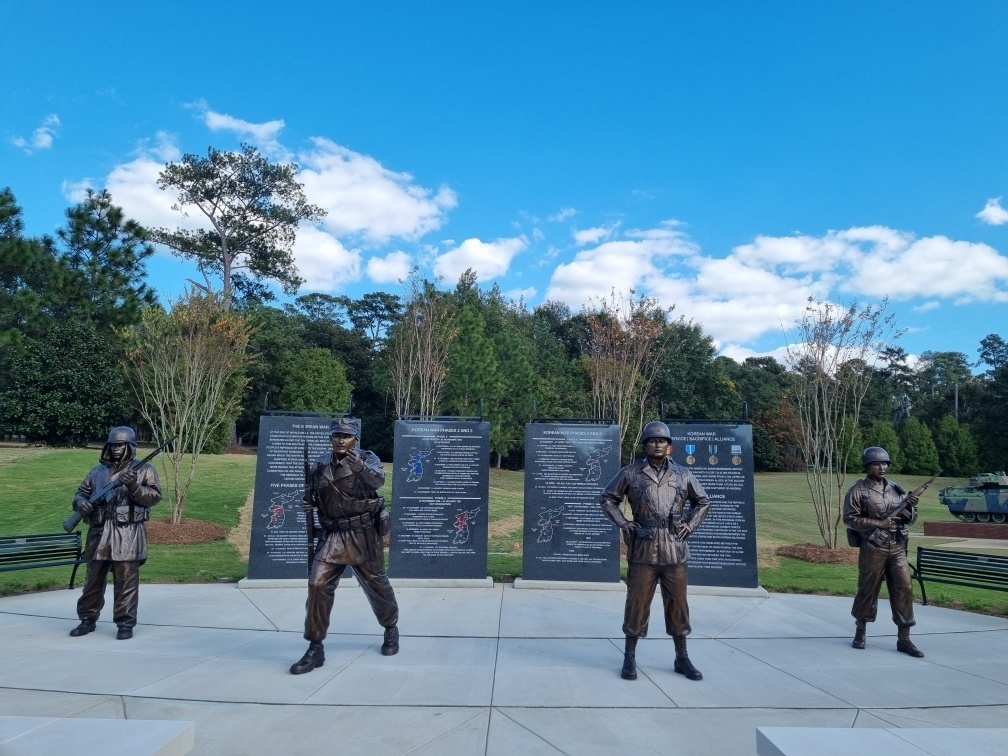 |
This photo, provided by South Korea's defense logistics attache Col. Kim Yong-sun, shows the new Korean War Memorial at the National Infantry Museum in Columbus, Georgia, on Thursday. (Yonhap) |
A new Korean War memorial opened at a high-profile museum in Georgia earlier this week to commemorate allied troops' sacrifices and their spirit that underpins the evolving alliance between South Korea and the United States, Seoul officials said Saturday.
The National Infantry Museum Foundation hosted a dedication ceremony for the Korean War Memorial at the museum in Columbus on Thursday, with the attendance of some 200 people, including veterans of the 1950-53 conflict and their families, as well as South Korean and US officials.
The participants included South Korea's Consul General in Atlanta Suh Sang-pyo, Sen. Randy Robertson, Georgia Gov. Brian Kemp, retired US Gen. Larry Ellis, Eighth Army Commander Lieut. Gen. Christopher LaNeve and Korea's defense logistics attache Col. Kim Yong-sun.
The highlight of the ceremony was an event unveiling bronze statues of four Korean War heroes: legendary Korean Gen. Paik Sun-yup and US Medal of Honor recipient Col. Ralph Puckett Jr., as well as two symbolic figures -- an American infantryman and a Korean augmentee to the US Army, better known as KATUSA.
Paik is credited with spearheading key battle operations during the war to defend South Korea against the communist invasion. Puckett is noted for his leadership in a fierce fight to secure Hill 205, a strategically crucial point, against Chinese attacks in 1950. Paik and Puckett died in July 2020 and April this year, respectively.
Standing behind the four statues were four granite panels that depict five key phases of the Korean War and contain maps of each phase and monthly timelines. Georgia's state government funded the construction of the memorial, according to Seoul officials.
"Having this memorial rife with such meaning and symbolism to honor the service of the armed forces and their families at that time is here to teach our future generations of the rich and deeply important history so this war is not forgotten," retired Brig. Gen. Peter Jones, the president of the museum foundation, said in his welcoming remarks.
Suh expressed his appreciation to veterans' dedication to defending South Korea during the war.
"My most heartfelt gratitude goes to our heroes, Korean War veterans. Thanks to their sacrifice, the Republic of Korea could defend freedom and democracy in the dire circumstances of the 1950s and has achieved today's miraculous economic success," he said.
He added, "Over the 70 years, the Korea-US alliance has been continuously strengthened and expanded from a military alliance into the economic, high-tech, science and cultural domains."
Casting the four statues as the symbol of the "everlasting" alliance," Suh expressed hope that the Georgia museum will become a "cradle of war history education" through the Korean War Memorial and other museum facilities.
In his speech, Ellis noted that the Korean War is the "longest war in American history" as the conflict is not legally over yet given that it ended in a truce rather than a permanent peace accord.
"We are still at war in Korea. Today, the threat from North Korea continues. It continues with even greater weapons of mass destruction and threats not only for the Republic of Korea (ROK) but to the specific region and to the world," he said, referring to South Korea by its official name.
"Despite the constant threats from North Korea, the United States and South Korean forces have united, and we celebrate years of partnership and prosperity," he added, noting the bilateral alliance has grown into a "worldwide partnership that serves as the cornerstone for security in the entire region."
He also recited the alliance's motto, "Katchi kapshida," in Korean, which means, "We go together."
"The US-Republic of Korea Army partnership has developed over the past seven decades into one of the most lethal, one of the most disciplined and combined, joint, interagency forces," he said. "Our two nations continue to stand as allies and friends. Every day we move closer to bringing freedom and justice to the people of the Republic of Korea."
Gov. Kemp portrayed the Korean War Memorial as a "vital" addition to the museum campus, ensuring visitors "for generations to come" will never forget those who served in the war.
"May it always be a reminder to those who fought to protect the ideals of liberty in the pursuit of happiness," he said, underscoring South Korea as a "true and lasting friend" to America.
On behalf of South Korea's Ministry of National Defense, defense attache Col. Kim expressed appreciation to the bereaved family of late Gen. Paik and Puckett's widow, Jeannie Puckett, and toured the Korean War exhibition hall inside the museum together with them.
The National Infantry Museum presents a wide variety of exhibits, both indoors and outdoors, to tell the story of American infantry soldiers from the Revolutionary War to the present day. (Yonhap)







![[Today’s K-pop] Blackpink’s Jennie, Lisa invited to Coachella as solo acts](http://res.heraldm.com/phpwas/restmb_idxmake.php?idx=644&simg=/content/image/2024/11/21/20241121050099_0.jpg)